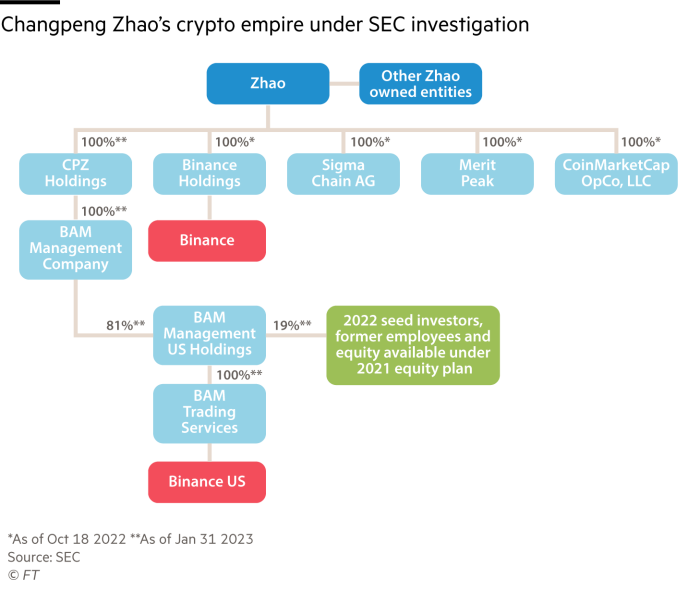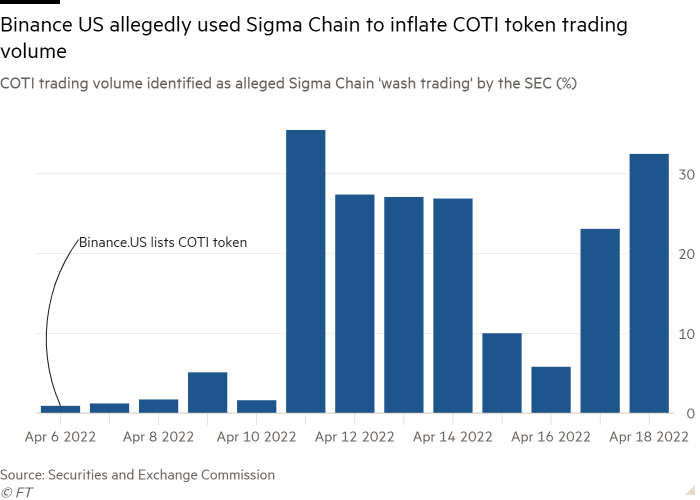Two secretive companies controlled by Binance’s chief executive lie at the heart of the US securities regulator’s lawsuit against the crypto exchange, with the agency honing in on alleged misuse of customer funds at the world’s biggest digital asset trading venue.
Central to the lawsuit filed this week by the Securities and Exchange Commission were allegations involving Merit Peak and Sigma Chain, two trading firms directly or indirectly owned by Binance chief executive Changpeng Zhao.
The companies were used to mix and redirect customer funds, as well as conduct “manipulative trading” on the US arm of Binance, the lawsuit said: Zhao and Binance used customer assets “as they please”.
The charges mark the most aggressive intervention so far by the SEC, led by the hard-charging Gary Gensler, against what it sees as unlicensed crypto activity in the US. The SEC also filed a lawsuit this week against Coinbase, another of the market’s highest-profile names.
While it accused both Coinbase and Binance of running unregulated securities exchanges — allegations both businesses deny — the SEC went further with its charges against Binance. In addition to allegations of misusing customer funds, the regulator has sought a temporary freeze on several Binance-linked entities. Zhao said on Thursday that Binance US had roughly $2bn in user funds “to the best of my knowledge”.
“The question is: was there fraud, and can the agency . . . prove that?” said Yuliya Guseva, vice-dean and head of the fintech and blockchain programme at New Jersey’s Rutgers University, about the SEC’s case against Binance.
The rush to freeze the assets was based on what the SEC alleges was free movement of client funds merged or rerouted mainly to Merit Peak.
The two units are beneficially owned by Zhao, according to the SEC. Merit Peak, which is incorporated in the British Virgin Islands, is a proprietary trading firm and tries to make money from moving market prices. It also offers market making, trying to tempt buyers and sellers into the market with competitive prices.
Meanwhile the regulator said that Sigma Chain, which is incorporated in Switzerland, had engaged in wash trading — a form of market manipulation — that had artificially inflated the trading volume on Binance US.
Accompanying documents, and Monday’s lawsuit, laid out a series of points showing the extent of Binance’s relationship with Sigma and Merit Peak which it deemed improper.
Exchanges typically match buyers and sellers at the best price, while market making and prop trading are usually carried out by separate companies that seek to profit from the price discrepancies between assets at rival trading venues.
The regulator alleges that Merit Peak received $22bn from Binance and related entities, while using Sigma Chain to inflate trading volume on Binance US, the company’s American arm.
The relationship stands in stark contrast to Zhao’s repeated claims that the firms and their actions are independent.
“Credibility is the most important asset for any exchange! If an exchange fakes their volumes, would you trust them with your funds?” Zhao said in 2019, according to the SEC.

“Crypto companies often claim there is no regulatory clarity for the industry but when it comes to running a traditional, centralised exchange, the standards have been in place for decades,” said Henri Arslanian, managing partner at crypto asset management firm Nine Blocks Capital Management. “It’s not that complicated.”
Binance said it was disappointed and disheartened by the SEC’s action, adding that while it took the regulator’s allegations seriously, they “should not be the subject of an SEC enforcement action”. Binance US called the lawsuit “baseless”.
The agency is seeking a so-called disgorgement, under which Binance would pay back any money it had made from alleged fraud as well as other penalties. “Disgorgement is the strongest remedy. It has been known to kill projects,” Guseva said, adding that if the SEC won “It may be existential” for Binance’s US operations.
Senators Elizabeth Warren and Chris Van Hollen, meanwhile, urged the US Department of Justice to investigate Binance and Binance US. They said the companies had told Congress that they were separate entities that prioritised compliance.
“If the allegations in the SEC filing are accurate, then it would appear that neither of these claims are true,” they wrote on Thursday.

Sigma Chain and Merit Peak had engaged in a series of transactions with Binance-affiliated companies from 2019, the SEC said, with their actions touching the regulated financial system through crypto-friendly banks Silvergate and Signature, which facilitated the payments. The transactions underscored how the apparently independent trading firms actually served Binance and Zhao.
Filings by the SEC also alleged that Merit Peak and Sigma Chain held accounts with crypto-friendly banks Silvergate, and Merit had one at Signature. Both banks collapsed earlier this year.
Between 2019 and 2021, accounts at Silvergate Bank and Signature received roughly $70bn from Binance-entities.
Almost all of those funds were sent from Merit Peak to a foreign affiliate of Paxos, a New York-regulated group that issued BUSD, a Binance-branded cryptocurrency which once represented roughly 40 per cent of Binance’s trading volume.
In February, New York regulators halted issuance of BUSD, citing “several unresolved issues” related to Paxos’s relationship with Binance for the token.
Despite Zhao’s repeated claims that Binance US is independent from the wider platform, the SEC said he used Merit Peak to send more than $16mn to a Binance-related entity to fund the operations of Binance US. The SEC described these funds as “critical” for the platform’s expenses.
Sigma Chain engaged in wash trading in 48 of 51 crypto assets that had been newly listed between January 2022 and June 23, 2022, to boost the appearance of activity, the SEC said.
The day after Binance US opened for trading, wash trading between Sigma Chain accounts owned by Zhao or associated with Binance senior employees constituted more than 99 per cent of the initial hour of trading volume in at least one crypto asset, according to the SEC.
“They deceived investors into thinking that the trading volumes on the platform were robust, real, and reliable,” the SEC said, adding that the entity lacked “any trade surveillance mechanisms until at least February 2022”.
“It is red meat to prosecutors and regulators when you see indications that senior executives showed wilful disregard for the rules. Authorities just can’t overlook that . . . that kind of thing can get you to the top of the target list,” said one former federal prosecutor based in Washington DC.

